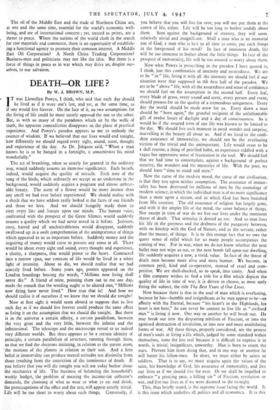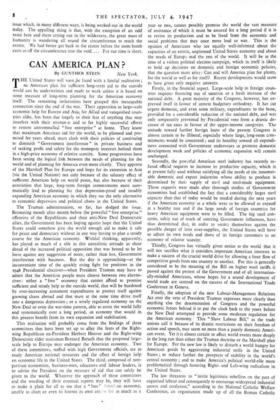DEATH-OR LIFE ?
By W. J. BROWN, M.P.
1T was Llewellyn Powys, I think, who said that each day should be lived as if it were one's last, and yet, at the same time, as if one would live forever. On the face of it, no two assumptions for the living of life could be more utterly opposed the one to the other. But, as with so many of the paradoxes which sit by the wells of truth, the apparent contradiction disappears on the plane of practical experience. And Powys's paradox appears to me to embody the essence of wisdom. If we believed that our lives would end tonight, how differently we should regard every sight, sound, scent, thought and experience of the day. As Dr. Johnson said, " When a man knows he is to be hanged in a fortnight, it concentrates his mind wonderfully."
The act of breathing, taken so utterly for granted in the ordinary way, would suddenly assume an immense significance. Each breath, indeed, would acquire the quality of miracle. Each note of the song of the birds, which ordinarily we accept as an undertone in the background, would suddenly acquire a poignant and almost unbear- able beauty. The scent of a flower would be more intense than any smell we had ever before experienced. We should realise with a shock that we have seldom really looked at the faces of our friends and those we love. And we should hungrily study them to rivet every line and feature upon our minds. The human voice, confronted with the prospect of the Great Silence, would suddenly assume a quality which we had never noted in it before. Jealousy, envy,..hatred and all uncharitableness would disappear, suddenly swallowed up in a swift comprehension of the unimportance of things which appeared to us so important before. Suddenly money and the acquiring of money would cease to possess any sense at all. There would be about every sight and sound, every thought and experience, a clarity, a sharpness, that would pierce to the heart. Contracted into a narrow span, our remnant of life would be lived in a white light of intensity. About to die, we should realise that we had scarcely lived before. - Some years ago, posters appeared on the London hoardings bearing the words, " Millions now living shall never die." A friend of mine, pointing them out to me one day, made the remark that the wording ought to be altered into, "Millions now dying have never lived." How true that is! And how we should realise it of ourselves if we knew that we should die tonight!
Now at first sight it would seem absurd to suppose that to live each day as if we should live forever could produce the same effect as living it on the assumption that we should die tonight. But there is in the universe a certain affinity, a certain parallelism, between the very great and the very little, between the infinite and the infinitesimal. The telescope and the microscope reveal to us indeed very different worlds. But there appears to be a certain identity of principle, a certain parallelism of structure, running through them, so that we find the electrons imitating, in relation to the parent atom, 'the motions of the planets in relation to their sun. And a firm belief in immortality can produce mental attitudes not dissimilar from those resulting front the conviction of the imminence of death. If you. believe that you will die tonight you will not today bother about the mechanics of life. The business of balancing the household's weekly budget, the problem of meeting the income-tax collector's demands, the choosing of what to wear or what to eat and drink, the preoccupations of the office and the rest, will appear utterly trivial. Life will be too short to worry about such things. Conversely, if you believe that you will live for ever, you will not put them at the centre of life, either. Life will be too long to bother unduly about them. Seen against the background of eternity, they will seem relatively trivial and insignificant. Shall a man who is an immortal son of God, a man who is heir to all time to come, put such things
in the foreground of his mind? In face of imminent death, life will be too immense to bother about the little things. In face of the prospect of immortality, life will be too assured to worry about them.
Now-what Powys is prescribing in the paradox I have quoted is, I think, just this combination of intensity and assuredness. We are to be " in" life, living it with all the intensity we should feel if our situation were that supposed in tht first half of the paradox. We are to be " above " life, with all the assuredness and sense of confidence we should feel on the assumption in the second half. Every leaf, every blade of grass, every sound and scent, every person and event, should possess for us the quality of a tremendous uniqueness. Every day the world should be made anew for us. Every dawn a man should be " born again," the grateful recipient of the unfathomable gift of twelve hours of daylight and a day of consciousness. So it would be if the assured term of our life was known to be limited to the day. We should live each moment in awed wonder and surprise, marvelling at the beauty all about us. And if we lived in the confi- dent assurance of immortality, we should not be the everlasting victims of the trivial and the unimportant. Life would cease to be a dull routine, a thing of petrified habit, an experience riddled with a vague but oppressive sense of frustration in the soul. We should feel that we had time to contemplate, against a background of perfect security, the wonders and the mysteries of life. With the poet, we should have " time to stand and stare."
Now the curse of the modern mood, the curse of our civilisation, is that they rest upon neither assumption. The assurance of immor- tality has been destroyed for millions of men by the cosmology of modern science, in which the individual man is of no more significance than a mote upon a stream, and in which God has been banished from His creation. The old assurance of religion has largely gone, and with it the ampler life of the mind, the saner balance of things. Nor except in time of war do we live our lives under the imminent threat of death. That stimulus is denied us too. And so man lives his life in the greyness and the drabness of the purgatory between, with no kinship with the God of Nature, and as the servant, rather than the master, of things. It is to this strange fact that we owe the queer sense of relief which for so many people accompanies the coming of war. For in war, when we do not know whether the next bullet may not wipe us out, or the next bomb fall upon our dwelling, life suddenly acquires a new, a vivid, value. In face of the threat of death men become more alive and more human. We become, in common peril, kind and co-operative, instead of cruel and com- petitive. We are shell-shocked, so to speak, into sanity. And when a film company wishes to find a title for a film which depicts the quality of life in time of war, it is driven to choose, as most aptly fitting the subject, the title The Best Years of Our Lives.
Now because there is that in the soul of man which is everlasting, because he has—humble and insignificant as he may appear to be—an affinity with the Eternal, because "his heart's in the Highlands, his heart is not here," he can never be content to live life as "civilised man " is living it now. One way or another he will break out. He may break out into the despairing nihilism of Fascism, or into the agonised destruction of revolution, or into new and more annihilating forms of war. All these things, properly considered, are the protest of men's souls at living a life which, judged by some standard within
themselves, none the less real because it is difficult to express it in words, is trivial, insignificant, unworthy. Man is born to storm the stars. Prevent him from doing that, and in one way or another he will batter his fellow-men. In short, we must either be saints or
soldiers. That is to say, we must acquire again the values of the saint, his knowledge of God, his assurance of immortality, and live our lives as if we should live for ever. Or we shall be impelled to embrace "a piercing pain, a killing sin" of Fascism, revolution or war, and live our lives as if we were doomed to die to-night.
This, thus briefly stated, is the supreme issue facing the world. It is this issue which underlies all politics and all economics. It is this issue which, in many different ways, is being worked out in the world today. The appalling thing is that, with the exception of an odd voice here and there crying out in the wilderness, the great mass of humanity is wandering all round the circumference to reach the centre. We had better get back to the centre before the atom bomb casts us off the circumference into the void.... For our time is short.







































 Previous page
Previous page